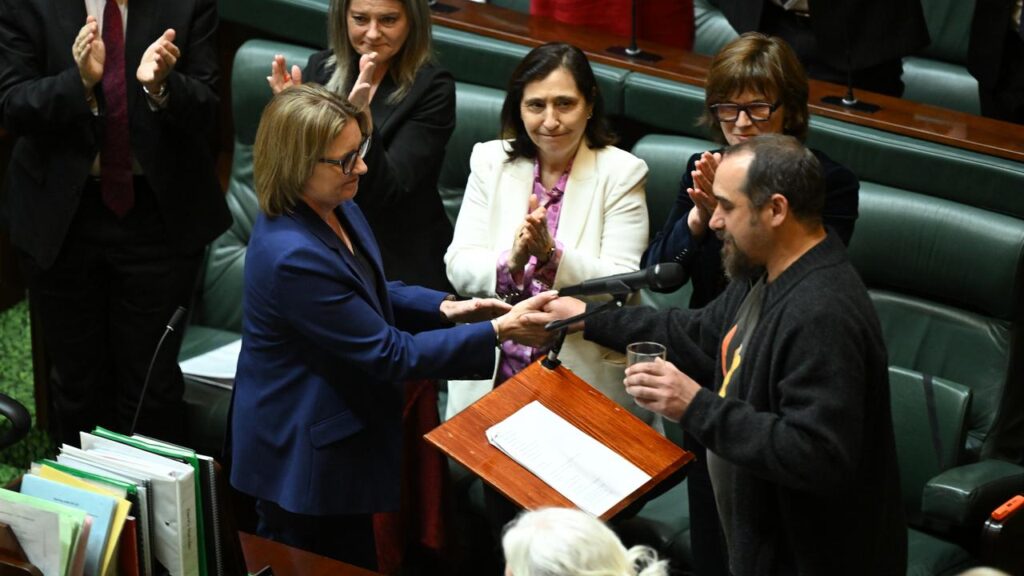Australian-first treaty opens path to truth and trust
Allanah Sciberras and William Ton |

The passing of Australia’s first treaty legislation marks the end of a centuries-long wait for Aboriginal communities, laying the foundation to strengthen truth, trust and advocacy.
First Victorians are celebrating after historic treaty laws cleared parliament, paving the way for better relations with the government.
Words could not capture the emotion of the moment for former Yoorook Commissioner Travis Lovett.
“Our people in Victoria have waited 191 years for this day. People have long advocated for truth and treaty and we are finally here,” Mr Lovett told AAP.
The in-principle agreement follows almost a year of negotiations between the government and First Peoples’ Assembly of Victoria and the end of a state truth-telling inquiry exposing the mistreatment of Aboriginal people since colonisation.
Yoorrook called for redress for post-colonisation pain and suffering in the form of restitution of traditional land, monetary compensation, tax relief or other financial benefits.
Mr Lovett said the commission worked to ensure the voices of people who spoke to the truth-telling inquiry were acted on and called on the government to uphold its commitment to build on the trust of Aboriginal Victorians.
“Our people and our kids being able to grow up in a treaty era, for us to be able to have further decision-making over our lives, is what treaty is all about,” Mr Lovett said.

With Yothu Yindi’s famed song Treaty playing on her phone, Victoria’s Treaty Minister Natalie Hutchins lauded the nation-leading achievement.
She referenced the nine-year life expectancy gap between non-Indigenous and Indigenous people, who also suffer high rates of homelessness, suicide and mental health challenges.
“There needs to be a new way forward,” Ms Hutchins said.
“Every single program where we’ve moved the dial across to Aboriginal organisations running those programs, we’ve had better outcomes in closing the gap.”
For Indigenous Labor MP Sheena Watt, the bill’s passage is recognition of the hardships, sorrow, dispossession and heartbreak her family has lived through.
“Our young people will live in a Victoria where their story will be valued, their elders will be heard by our parliament, and their dreams have a real place in shaping the future,” she said.
Under the treaty bill, the state’s Indigenous representative body will be made permanent and granted expanded powers, and a future apology will be delivered in parliament.
The bill will arrive on the governor’s desk for approval before the government ratifies the legislation at a public signing on December 12.

Independent senator Lidia Thorpe – a Gunnai, Gunditjmara and Djab Wurrung woman – said the treaty was a long time coming.
While it doesn’t cover Crown land, it paves the way for a renewed relationship that respects Aboriginal people’s cultural links as custodians of the lands and waterways.
“Treaty is an end to the war on our people and that’s what I believe we need to continue to fight for,” Senator Thorpe told AAP.
Victoria’s move towards treaty could allow other states and territories to learn lessons from the process, UNSW law associate professor Harry Hobbs said.
“It won’t necessarily lead to more treaties across the country, but when other states decide they want to open negotiations with Aboriginal and Torres Strait Islander people and acknowledge the historic and ongoing effects of colonisation … they can look at Victoria,” Dr Hobbs said.

Victorian deputy opposition leader Sam Groth warned the treaty could lead to compensation and land return to Aboriginal people.
“It certainly didn’t close the door to some of those other things that people may be worried about. It leaves a lot of those things wide open,” he said.
The party promises to repeal the law within 100 days if it wins government at the next state election.
13YARN 13 92 76
Lifeline 13 11 14
AAP